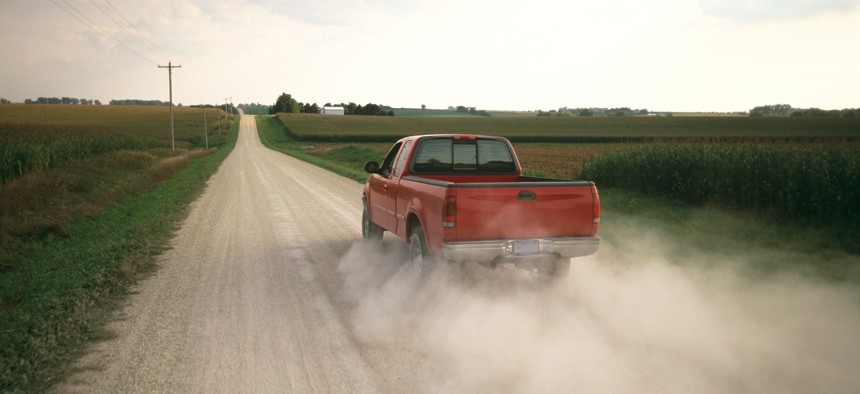Rural Leaders Fear They’ll Miss Out on Infrastructure Money

iStock.com/JMichl
Small towns might not have the staff to write grants, according to state and association officials.
This story was originally posted by Stateline, an initiative of the Pew Charitable Trusts.
For decades, rural communities have struggled to maintain crumbling roads and bridges in the face of shrinking tax bases and diminishing resources. COVID-19 has only made the situation worse, by halting infrastructure projects and diverting public resources away from repaving roads to public health.
In theory, the $1.2 trillion infrastructure law that President Joe Biden signed last week should provide a huge boost. Much of that money will flow to state governments, with the most populous states getting the largest amounts. Then cities, towns and counties will compete for grants and loans, with state officials deciding who gets what. Federal officials will maintain control of about $120 billion, part of which will be doled out through competitive grants.
But rural leaders worry that they lack the staff and matching dollars to compete with bigger cities for their fair share of the bounty.
“In small, conservative states like Nebraska [for example], we’ve seen challenges with responding to federal stimulus dollars,” said Johnathan Hladik, policy director for the Center for Rural Affairs.
“And in many circumstances,” he said, “there isn’t the internal infrastructure to accept federal money, develop ideas for how it could be spent, develop regulations for how it should be spent, and go ahead and implement it.”
State agencies ought to help small communities that don’t have the people or money to compete with larger neighbors, said Shawn Wilson, secretary of the Louisiana Department of Transportation and Development and the newly elected president of the American Association of State Highway and Transportation Officials.
For some rural and small-town communities, sometimes the question isn’t whether they can secure the funds, Wilson said in an interview, but rather: “Can they actually close the deal on the grant, implement the grant and not find themselves in all kinds of trouble because of not following federal regulations or not being accustomed to it?
“Those are real issues that happen in rural communities all across the country today.”
associate legislative director for human services and education.
In Clarksdale, Mississippi, a predominately Black town where about 36% of people live in poverty, Mayor Chuck Espy said the town has struggled to pay for infrastructure repairs for years.
In 2019, voters passed an infrastructure bond bill to mitigate flood issues, pave sidewalks and repair bridges, but the city had to find matching grant opportunities to help offset the tax increase on residents. After applying for various grants, in 2020 the city received a federal Community Block Development Grant and funding from the state transportation department. Even then, at least one project’s fate was dependent on more grant funding, the Clarksdale Press Register reported.
“We talk about delivering for the Delta, but the upper echelon of [state lawmakers] attempts to take care of the Gulf Coast and east Mississippi first,” Espy said. “They need to honor what they've always said, ‘To make sure those dollars are disproportionately and equally distributed.’”
Jas N Smith, a spokesperson for the Mississippi Department of Transportation, said the agency will secure funding for as many local projects as it can, but that will depend on the amount of available money and the scope of projects being proposed.
In addition to the state’s transportation commissioners and internal engineers, Smith said the county governments play a role in ranking and prioritizing infrastructure projects and which towns should receive funds. And project decisions can depend on population, time, need and safety, he said.
Smith said his agency has always prioritized projects that need to get done for safety reasons.
“If there’s a major safety concern, we’re gonna find a way to do what needs to be done to make the highway safe for everyone, but that means some of the other projects that weren’t safety-based got pushed back some.”
However, there isn’t a plan right now, Smith said, for how funds will be rolled out or to whom.
Hladik called on state officials to heed the concerns of rural leaders as they receive more information about the rollout of the infrastructure package.
“The local leaders we have in rural communities are just trying to do their best,” he said. “They’re just making sure that the roads have gravel on them.”
Aallyah Wright is a staff writer Stateline.

NEXT STORY: Pod security for 5G cloud infrastructure





